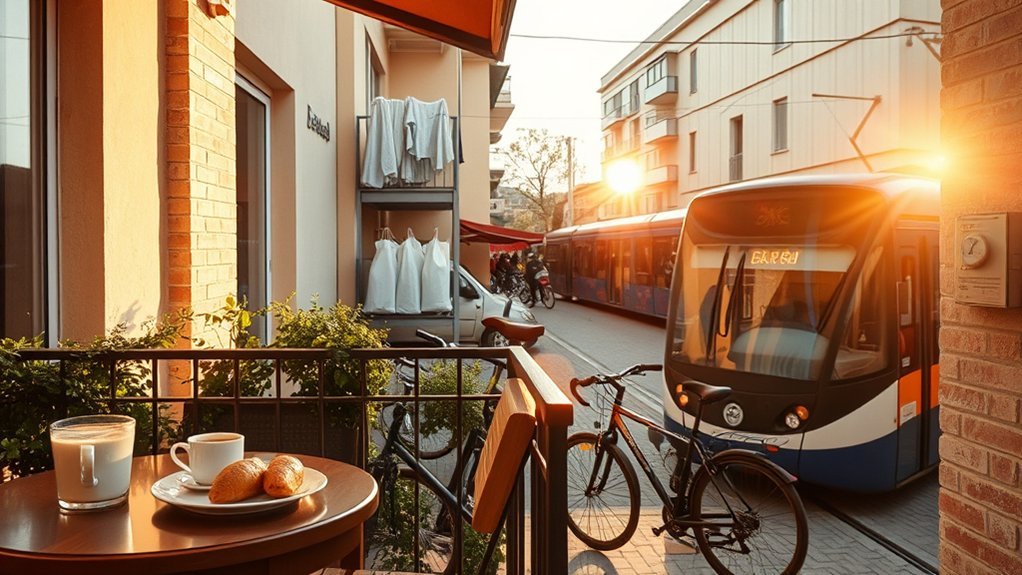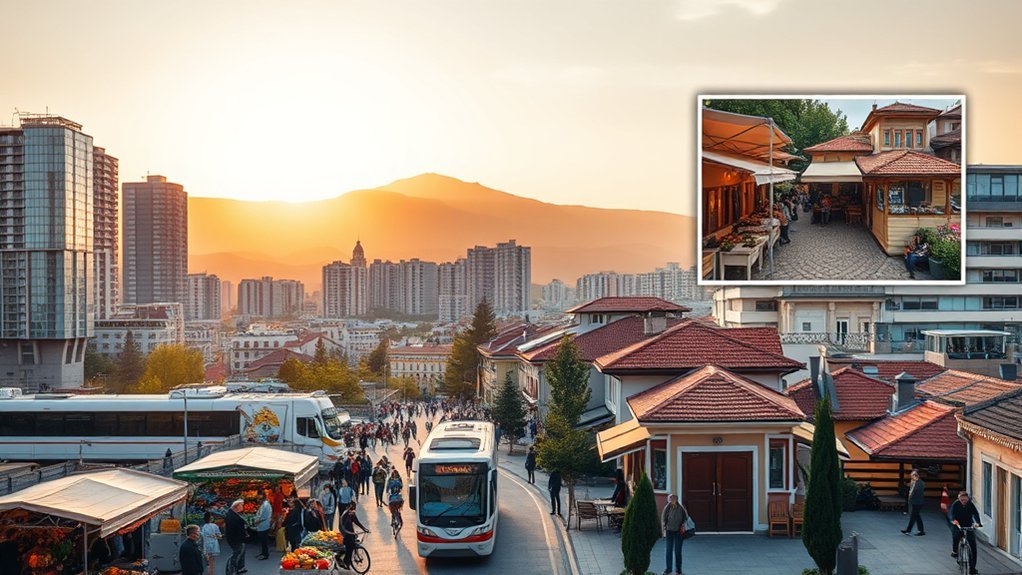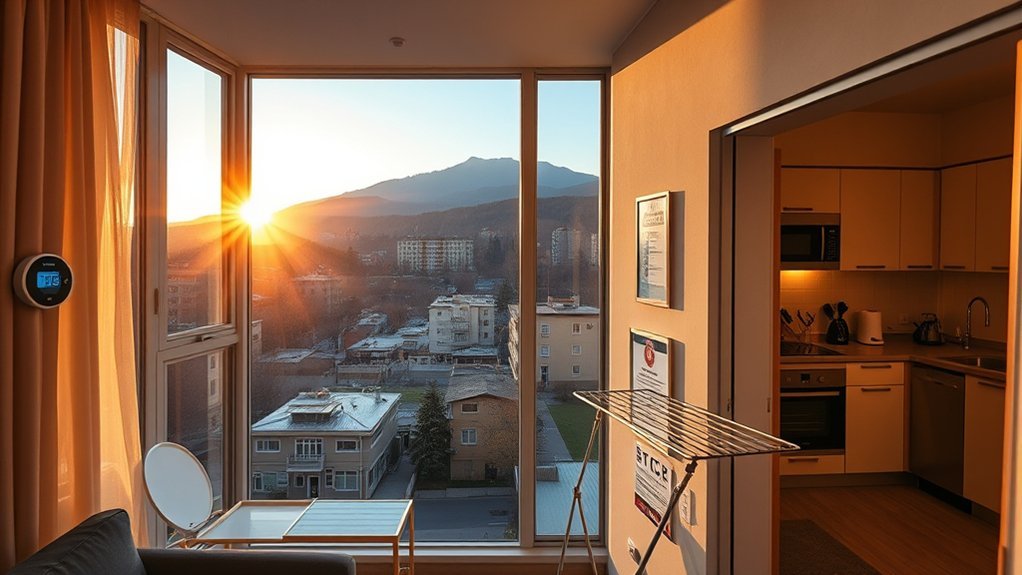You can live comfortably in Bulgaria on roughly €700–€1,200 per month depending on city and lifestyle, with Sofia toward the higher end due to higher rents and salaries. One-bedroom city-center rent averages ~798 лв in Sofia and is significantly lower in Varna, Plovdiv and Burgas. Utilities add ~210 лв, monthly transport ~50 лв, and groceries/dining are inexpensive compared with Western Europe. Keep going to see detailed city, housing and budgeting breakdowns.
Overview of Living Costs in Bulgaria

Although Bulgaria is one of Europe’s most budget-friendly countries, costs vary greatly between cities and rural areas: the national cost-of-living index is 38.3, with Sofia at 39.6, showing urban premiums.
Bulgaria is among Europe’s most budget-friendly countries, though costs differ significantly between cities and rural areas.
You’ll find the overall cost of living low by European standards, but you should budget according to household size and location. A family of four faces estimated monthly expenses in Bulgaria around 5,382 лв, while a single person’s living expenses hover near 2,175 лв.
Rent drives variation: a one-bedroom in a city center averages 798.05 лв versus 608.12 лв outside the center. Utilities for a standard 915 sq ft apartment add about 210.04 лв monthly, a predictable component of recurring costs.
Dining is affordable—expect roughly 70.00 лв for a mid-range meal for two—so discretionary spending stays reasonable.
Use these comparative figures to model your budget and prioritize rent, utilities, and food when planning expenses in Bulgaria.
Cost Differences Between Major Cities

You’ll notice city-center rent in Sofia averages 798.05 лв for a one-bedroom, about 31% higher than the 608.12 лв typical outside the center.
That gap often explains much of the cost-of-living spread between Sofia (index 39.6) and other cities like Varna (37.5), Burgas (35.4) and Plovdiv (34.5).
Expect local dining and grocery prices to be modestly higher in Sofia and Varna compared with Burgas and Plovdiv, while transportation costs stay near 50.00 лв per month across cities.
Compare these housing and food differentials against average net salary in Sofia (≈1,738.67 лв) to judge disposable income impact.
City Centre Vs Suburbs
Across Bulgaria, living in a city centre typically costs noticeably more than in the suburbs: average rent for a 1‑bedroom apartment is about 798.05 лв downtown versus 608.12 лв outside the centre, and Sofia’s cost-of-living index (39.6) tops Varna (37.5) and Burgas (35.4).
You’ll find major cities push overall expenses higher: monthly costs for a single person can reach 2,175 лв in central areas, driven by pricier housing and transport.
Choose suburbs and you’ll cut rent and utility bills, lowering monthly totals considerably, though you sacrifice some convenience and access to amenities.
Public transport passes run about 50.00 лв in city centres; suburban services may cost less but are often less frequent.
Compare locales by weighting travel time against budget.
Rent and Housing Costs
Having seen how city-centre living pushes up monthly totals, let’s look specifically at how rents vary between Bulgaria’s major cities.
You’ll find Sofia commands the highest 1-bedroom city-centre rent at 798.05 лв (608.12 лв outside centre). Varna’s 1-bedroom city-centre rent is about 37.5% lower than Sofia’s. Burgas is roughly 35.4% cheaper, and Plovdiv about 34.5% less, making Plovdiv the most affordable among the four for 1-bed central flats.
For larger units, Sofia’s 3-bedroom city-centre average is 1,439.07 лв; Varna’s is lower at approximately 1,351.00 лв.
If you’re moving to Bulgaria, these city differentials help you choose location versus space—Sofia costs more, coastal and regional cities offer notable savings.
Local Dining and Groceries
While dining costs stay fairly similar across major Bulgarian cities, subtle differences can sway your budget: an inexpensive meal runs about 18.00 лв in Sofia and roughly 17.50 лв in Varna, while a mid-range dinner for two is about 70.00 лв in Sofia and 68.00 лв in Burgas.
You’ll find groceries like 1 kg of tomatoes at ~5.20 лв everywhere, but domestic beer is ~3.96 лв in Sofia versus ~3.80 лв in Plovdiv.
Urban dining tends to be more affordable than smaller towns, pushing you toward local markets and family owned restaurants for value and authentic dining experiences.
- Inexpensive meal: Sofia 18.00 лв, Varna 17.50 лв
- Mid-range dinner for two: Sofia 70.00 лв, Burgas 68.00 лв
- Tomatoes (1 kg): ~5.20 лв nationwide
- Domestic beer: Sofia 3.96 лв, Plovdiv 3.80 лв
Rent, Utilities and Housing Expenses

If you prioritize city-center living, expect to pay about 798.05 лв for a one‑bedroom and 1,439.07 лв for a three‑bedroom, versus roughly 608.12 лв and 1,007.17 лв outside the center.
You’ll want to monitor housing market trends: city-center purchase prices average 372.30 лв per sq ft (range 213.68–603.86 лв), so buying can be competitive compared with rent over time.
Rental agreements explained: furnished one-bedrooms in center commonly ask €300–€500; outside, €200–€350. Check lease length, deposit rules and utility responsibility before signing.
Furnished one‑bedrooms often rent for €300–€500 in the center, €200–€350 outside — review lease length, deposit and utilities.
Utilities for a ~915 sq ft flat average 210.04 лв/month (range 127.50–400.00 лв); factor this into total monthly housing cost.
For cost saving strategies, consider suburbs, longer leases for lower monthly rates, shared larger apartments, and energy-efficient habits to reduce utility swings.
Use these data points to compare scenarios and decide whether renting or buying better suits your budget and lifestyle.
Food, Groceries and Dining Out

You’ll find typical grocery prices in Bulgaria are lower than in many Western European countries — for example, 12 large eggs cost about 8.00 лв and 1 kg of tomatoes around 5.20 лв.
Eating out is also affordable: an inexpensive restaurant meal runs roughly 18.00 лв, a mid-range dinner for two about 70.00 лв, and fast food meals are usually under 6.00 лв.
Local market produce (apples ~3.87 лв/kg, potatoes ~2.07 лв/kg), coffee (~3.51 лв) and domestic beer (~3.96 лв) make regular dining out or home cooking manageable on a budget.
Typical Grocery Prices
One look at everyday shopping shows groceries and dining in Bulgaria are affordable compared with many Western European countries: a dozen large eggs run about 8 лв, 1 kg of tomatoes costs roughly 5.20 лв, apples are ~3.87 лв/kg and potatoes ~2.07 лв/kg, while a 0.5 L domestic beer is around 1.96 лв.
Eating out is also cheap—inexpensive meals are about 18 лв, fast food under 6 лв, and a mid-range dinner for two typically sits near 70 лв (range 50–120 лв).
You’ll compare costs quickly and benefit from grocery shopping tips and local market options, especially for seasonal produce availability.
- Buy seasonal fruit and veg at markets.
- Compare supermarket brands.
- Use bulk staples to lower per-unit cost.
- Track weekly promotions.
Eating Out Costs
Eating out in Bulgaria stays particularly cheaper than in much of Western Europe: inexpensive restaurant meals run about 18.00 лв (typically 10–30 лв), fast food comes in under 6 лв, and a mid-range dinner for two averages roughly 70.00 лв (50–120 лв).
You’ll find restaurant experiences that mix value and quality; local cuisines like Shopska salad, banitsa and grilled meats cost considerably less than similar meals abroad.
Basic groceries—8 лв for 12 eggs, 5.20 лв/kg tomatoes—keep home cooking economical, and local markets push prices down further.
When dining out, you’ll notice relaxed dining etiquette: casual dress is common, service charges aren’t ubiquitous, and tipping around 5–10% is typical.
Transportation and Vehicle Costs

Although public transit in Bulgarian cities is cheap — a single ticket runs about 1.60 лв and a monthly pass roughly 50.00 лв — rural areas often lack service, so you’ll frequently need a car for reliable mobility.
You’ll weigh public transport options against car ownership: city residents often save using buses and trams, while suburban or rural living makes a vehicle essential.
Fuel is affordable at ~2.67 лв/l, reducing running costs, but purchase prices are significant — a new Volkswagen Golf averages 54,658.00 лв.
Taxi services remain a flexible intermediate choice; fares start near 2.20 лв and a 5 km trip typically costs 4–6 лв.
- Compare monthly pass (50.00 лв) vs. average taxi trips for commuting.
- Factor fuel (2.67 лв/l) into monthly driving budgets.
- Include vehicle maintenance and insurance when evaluating total cost.
- Consider purchase amortization: high upfront cost vs. long-term mobility benefits.
Healthcare, Insurance and Education

While public healthcare is available, you’ll often opt for private services to avoid long waits and access higher-quality care—private doctor visits typically run €20–€40, and full private insurance costs about €40–€80 per month, offering faster access and broader coverage.
Public healthcare exists, but many choose private care—doctor visits €20–€40, private insurance €40–€80/month for faster, broader access
You’ll find private healthcare options widely available in cities; a private doctor visit averages €81 in some reports, medicines like a box of antibiotics cost ~€33, and private clinics reduce waiting times and diagnostic delays.
When comparing costs, expat insurance plans often mirror local private premiums but add repatriation and broader networks, so factor those extras into annual budgets.
For education, private preschool full-day is about 830.83 лв per child, while international primary tuition ranges €6,000–€26,000 yearly.
Overall, healthcare and schooling costs in Bulgaria are substantially lower than Western European equivalents, improving value-for-money.
Use an education quality comparison to weigh boutique international schools against local options and balance cost, curriculum, and language needs.
Entertainment, Fitness and Lifestyle Spending

One of the strengths of living in Bulgaria is its low-cost lifestyle: a monthly gym membership in a business district averages about 91 лв, cinema tickets run 5–7 лв, museum entries are typically 3–10 лв, and many cultural or outdoor events are free or very cheap, so you’ll spend markedly less on leisure than in Western Europe while still accessing a wide range of activities.
You’ll find a balance between affordability and variety: accessible fitness trends, diverse cultural activities and reliable entertainment options.
- Gym membership — ~91 лв/month in business districts (competitive vs Western Europe).
- Cinema — 5–7 лв per ticket (frequent, low-cost nights out).
- Museums & cultural events — 3–10 лв; many free outdoor festivals.
- Private doctor visits — 20–40 лв (relevant to active lifestyle planning).
This data-driven snapshot shows you can maintain a modern, active lifestyle without high leisure costs, letting you allocate more to travel, dining, or savings while enjoying robust local offerings.
Budgeting Tips for Expats and Remote Workers

Because your biggest cost will be rent, plan your monthly budget around €700–€1,200 depending on city and lifestyle: city-center one-bed flats run about €300–€500, outskirts €200–€350, groceries are cheap (bread ~€0.80, milk €1.00/L, a dozen eggs ~€2.00), and transport passes cost €20–€30 — leaving room for private healthcare (€20–€40 per visit or insurance €40–€80/month) and leisure without exceeding typical Western European expenses.
Start with straightforward budgeting strategies: allocate 40–50% to rent/utilities, 15–20% to food and transport, 5–10% to healthcare, and 15–30% to savings or discretionary spending.
Use simple financial planning tools or spreadsheets to model city variants (Sofia vs smaller towns) and test scenarios. Track expenses weekly with an app or CSV to spot overspend categories.
Prioritize furnished short-term rentals when scouting, compare insurance vs pay-per-visit healthcare, and build a one-month buffer. Regular expense tracking lets you adjust allocations quickly and maintain predictable living costs as an expat or remote worker.
Frequently Asked Questions
Can Americans Live in Bulgaria?
Yes—you can live in Bulgaria; you’ll meet visa requirements for residency, adapt via cultural adjustments compared to the U.S., and tap expat communities for support. It’s affordable, data shows lower costs and accessible services.
How Much Money Do You Need to Retire in Bulgaria From the USA?
Like a bargain hunter spotting a gem, you’ll need about €700–€1,200 monthly for retirement planning in Bulgaria; cost comparison shows savings versus the USA, and expat experiences confirm affordable rent, utilities, groceries, and healthcare.
Is Bulgaria Cheaper Than the USA?
Yes — Bulgaria’s cheaper than the USA: cost comparison shows lower living expenses (rent, dining, utilities) while quality of life remains decent; salaries are lower, so your purchasing power depends on income and lifestyle choices.
How Much Does an Apartment Cost in Bulgaria?
You’ll find rental prices around 798 лв (1‑bed city) and 608 лв (outside); 3‑beds about 1,439 лв/1,007 лв. The property market averages 372.30 лв/ft²; cost comparison shows Bulgaria’s generally cheaper.
Conclusion
You’ll find Bulgaria gently kinder to your wallet than most of Western Europe: rents are fractionally priced, groceries and dining run cheaper, and transport and healthcare won’t nick your savings. Sofia and Varna are pricier than smaller towns, but still economical compared with EU averages. If you’re comparing budgets, expect 30–50% lower monthly costs overall. With modest adjustments to lifestyle and housing choices, your purchasing power will pleasantly stretch further here.


